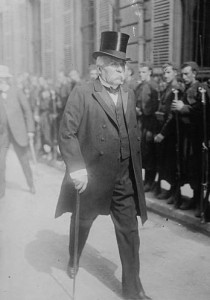 In 2010, Kenneth Block, Chairman of the Moderate Party took a run at Governor. His decently-publicized (for a third party) campaign achieved 6.5% of the vote (22,146 votes); enough that if only half his voters had shifted to Republican candidate John Robataille, Republican would now be in their fifth term as governor. Considering voter rolls the year before placed the number of registered Moderates at 52 in the entire state, Mr. Block had a good turnout.
In 2010, Kenneth Block, Chairman of the Moderate Party took a run at Governor. His decently-publicized (for a third party) campaign achieved 6.5% of the vote (22,146 votes); enough that if only half his voters had shifted to Republican candidate John Robataille, Republican would now be in their fifth term as governor. Considering voter rolls the year before placed the number of registered Moderates at 52 in the entire state, Mr. Block had a good turnout.
More astounding was the Attorney General candidate, the near-unheard of Christopher Little, who pulled 14.4% of the vote and out-did the Moderates’ top-of-the-ticket candidate. Mr. Little had 47,328 voters select him, over 25,000 more than picked Mr. Block. In Providence, Mr. Little actually came in second over the Republican candidate, Erik Wallin. Both ultimately lost to Peter Kilmartin.
Did anyone else in the Moderates accomplish anything? Not really. Four candidates contested seats in the House. Mostly Democrats sailed to victory (often uncontested), with the closest races being where Republicans triumphed over Democrats. Moderates did best in the House races when Republicans weren’t running. Not a single candidate for Senate existed ran.

The argument for me is pretty clear here: the race for Governor was at least a distraction for the Moderates. At best, it should’ve been a rallying point. I seem to recall there were rumors about having Lincoln Chafee on the ticket as a Moderate. Regardless of his policies, this would’ve been a massive boon the Moderates. If it could’ve happened, it probably should’ve. But even with a well-known, and at that time, well-liked candidate, the Moderates wouldn’t have solved all their problems.
Their main problem, is this: what are they about? Well, their website and Wikipedia pages offer their “4 E’s”: Economy, Education, Ethics, and the Environment! Under the economy: be more like Massachusetts, reduce spending, cut spending, and end “waste and fraud”. WPRI reporter Tim White probably has something to say about that last bit. Educations is the slate of education deforms we’ve come to expect from those advocating the corporate model; don’t pay teachers attractive wages, evaluate their students rigorously, put the inexperienced in teaching jobs as though this will make students learn better (it takes about three years for a teacher to become truly effective). Ethics is just a shot at the not-really corrupt political culture. The Environmental policy is actually pretty progressive, and something I can get behind.
Still, all it does is position the Moderates as “not-Republicans”. Just as the Republicans can’t afford to be merely the anti-Democrats, the Moderates have to be more than not-Republicans. Independents function just as well as not-Republicans, and are more reliable in terms of contesting races than the Moderates. So, how to solve these dilemmas?
First, drop the terms “moderate” and “centrist”. First, they’re relative. Moderate to what? The Democrats? The Democrats are all over the map. Moderate really only means “moderate Republican”, because the Democratic Party hasn’t rooted out its moderates in the same fashion conservatives have gone after moderate Republicans. Centrism is likewise a malleable ideal. You’re only in the center in appearance to other parties. If those parties shift (like if Republicans tilt leftward or Democrats tilt right), then you’re no longer centrist. Centrism just means you’re letting other people set the terms of the debate. Let’s put it this way: if you were centrist in the 1850s on slavery, then you probably favored something like Jim Crow. Jump ahead thirty years. Are you centrist any more?
If the counter-argument is that “Democratic” and “Republican” are just as relative terms, that’s true, but not in the same way. See, Democratic and Republican are both terms that their owners give meaning to (well, their opponents are often involved in ascribing negative meanings). It means that the parties never have to be reactionary, they’re almost always setting their issues for themselves.
The other problem with “moderate” is that it’s not really a rallying cry. Take Occupy Wall St. That organization has its battle cry right in its name. It lends itself to posters of shouting people with “Occupy” flying from their mouths. It’s active. When you hear the word “moderate”, you don’t think action. Here’s Thesaurus.com’s list of synonyms for moderate: abstinent, balanced, bearable, careful, cautious, compromising, conservative, considerate, considered, controlled, cool, deliberate, disciplined, dispassionate, equable, even, gentle, impartial, inconsiderable, inexpensive, judicious, limited, low-key, measured, middle-of-the-road, midway, mild, modest, monotonous, neutral, nonpartisan, not excessive, pacific, peaceable, pleasant, reasonable, reserved, restrained, sober, soft, steady, straight, tame, tolerable, tolerant, tranquil, untroubled”. Not all of those are bad things to be associated with, but most don’t lend themselves to partisanship. Untroubled people don’t campaign, they don’t really vote. Impartial people don’t care. Low-key people don’t attend rallies. Monotonous people shouldn’t run for government (although many do).

But what about the Moderate Party in Sweden? They’re the government. But a quick perusal of their history and you’ll discover that the Moderate name is a rebranding of what was called the Rightist Party previously. Furthermore, they stand for liberal conservatism, not moderation (economic free-market liberalism combined with traditional conservative values). The RI Moderate Party is trying to stake out its own position under the Moderate label, not rebrand themselves to play down their extremism.
But rebranding is precisely what they’ll have to do. Their policies can’t be moderate positions between left and right, they have to be clear alternatives to those presented by Democrats and Republicans; or at least presented that way. Furthermore, liberal voters are a large, reliable portion of the state’s voters, but there is nothing on the Moderate Party’s website that would appeal to them past the environmental issues. If you could attract liberals and progressives on the environment alone, then the Green Party would be a force to be reckoned with.
Second, stop insulting Rhode Islanders. Don’t say the state is corrupt. Why? Because it implies that voters are willingly enabling corruption. Voters tend to trust their own representative to do the right thing, and view other representatives as causing trouble. So a candidate for office can’t succeed by portraying another candidate as corrupt unless that candidate actually is corrupt, and has been proven to be so. Rhode Island is great, and any party has to say they’ll make it better than it is. Even in the depths of its despair, there is still greatness in Rhode Island, and that greatness is what any party needs to focus on. Makes ethics important, but don’t make it a major plank of your party. Furthermore, by not emphasizing it so much, it won’t hurt you as much when you violate ethics laws.

Third, get rid of any “X-Point Plan” that is not three points (the Moderates have a Six-Point Plan for ethics). Anything overly complex leaves you open to Clemenceau’s criticism of President Wilson’s Fourteen Points: “Fourteen? God Almighty only had ten!” People also stop paying attention after too many (Angel Taveras had something like a twelve point plan for Providence, but it’s never mentioned these days). Three points is enough; the weakest comes second and the strongest comes last. This is basic rhetoric.
Fourth, ignore the governor’s office (and most statewide offices). This might seem counterintuitive, but given that the Moderates are on the ballot because of gathering enough signatures, the governor’s office means nothing for them. The Governor can do little in Rhode Island, especially against a Democratic General Assembly which hasn’t had a Democratic governor to cooperate with since Bruce Sundlun. By not competing for the governor, you also don’t get the stink of being a perennial loser on your party. Cities and towns are where the Moderates should be focusing. Successfully run one of those and then you have a case to make about responsible administration to the rest of the state. Take Senate and House seats, but only when you have enough that you are power-brokers should you run for governor. Then you can pass your agenda.
A party shouldn’t be a vehicle for Ken Block to become governor. It needs to be something more. A party persists. By not focusing on down-ticket races, the Moderate Party shows it’s not committed to building a party. Those small races and positions should be thought of as your farm league. They’re going to provide a large portion of the talent that will make any party last. They also point the way on positions and issues that will be important to your party down the line. Furthermore, gathering signatures for the party is such a ground-game method of running, it’s surprising that wasn’t translated into more candidates down-ticket.
Do I think the Moderates will listen to this? Not really. But if their goal is to become a genuine party and not just a Rhode Island sideshow, then hopefully they’re already having this discussion.

